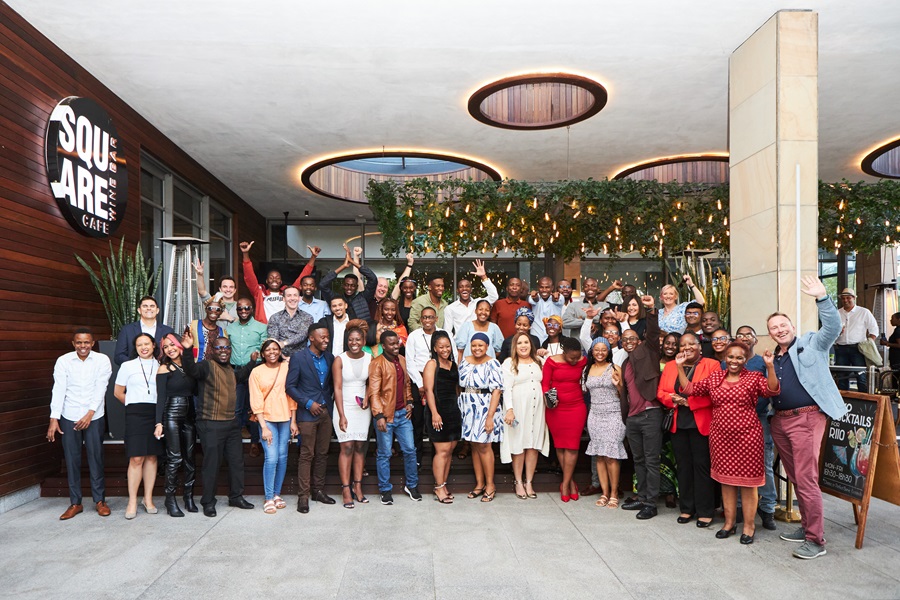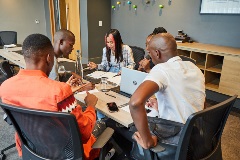DIGISKILLS AFRICA CASE STUDY

KELLY'S STORY
I am from Nairobi, Kenya. I am a Malaria researcher a the Kenya Institute of Primary Research. I’ve been there for over 3 years now. I have a Bachelors Degree in Microbiology and I an ongoing Masters Degree in immunology.
I started out as a snake bite researcher and one of my supervisors was a malaria researcher, so I then found myself more interested in the malaria work and that’s where my passion grew.
I am a part of iGEM, which is a community that offers support in synthetic biology. Through iGem, I was able to travel to Ghana where I connected with someone who works for a research fund in West Africa and he sent the Digiskills Africa opportunity into a group that we are in and recommended I applied for it and then I got it!
I was doing natural compounds for the treatment of Malaria. Our goal is to commercialise our products. We are current developing an anti-venom. At the moment, every anti-venom is being imported and costs the government 8 billion shillings per financial year. The direction we are heading towards is to be the ones producing all of these treatments, we don’t want to be importing malaria medicine or snake bite venom. This is why I wanted to attend the Digiskills Africa Programme. I saw it as an opportunity to learn what people are doing in the industry in the manufacturing industry.
The main thing I learnt from the programme was the digitalisation of the industry. We don’t have to be doing everything manually anymore, instead of doing all this strenuous work we can use that time to do something more worthwhile. A lot of institutions in Kenya are backwards, we don’t have a lot of machinery, we do a lot of things by hand which leaves room for error. I wanted to pass on those digital skills I learnt back to my workplace and move everything to the concept of Industry 5.0.
I believe that apply concepts of Industry 5.0 to fractionation would be very beneficial. The fractionation of natural compounds is all done by hand, on paper and it is a long process. In a month you may only extract one compound. As well as chromatography, I can’t believe we are still doing that manually.
Aside from the industry aspect, I loved learning about how to write a cv and approach companies for job interviews. Through that I have been able to get funding from the Bill and Melinda Gates Foundation to run mathematical modelling for malaria researchers at our Institute. The workshop will run on the last week of November for 30 people. They will learn data analysis, epidemiology, mathematical modelling and malaria prevenation. This is one of my biggest achievements from the programme. The grant was 450,000 Kenyan shillings, we partnered with another institution called Amnet who focus on Maleria Modelling and through this collaboration we took our malaria research and brought it to the experts because we want our work to be impactful. It relates to the common Kenya people, right now people are not benefiting from our research.
I saw the success of the iGem group so after the programme, I started my own group called Bio Opportunities and right now we have 300 members. I am making sure that opportunities are shared and are not just sitting silently online. I follow many pages for PhD opportunities, conferences, and scholarships and I post them in one consolidated place. So everyone who’s in the Biofield has something outside their 9 – 5.
The Kenya Institute has recently collaborated with a Bio vaccine manufacturing plant and I hope that I can take the skills and knowledge from the Digiskills Africa Programme and apply them to this collaboration.
In my day-to-day jobs, I work with animals in clinical studies. It is important to start with the animals when the sun is up. You have to shoot them, do blood extraction, and immunisation and then we come back to the lab to do malaria parasite culture. We then check emails and update our progress to each other in the malaria network. Every day is different so I love my job.
In the next 5 years, I want to join the Malaria research unit in Gambia to analyse the novel detection method for malaria.
I am very happy that I completed the Digskills Africa programme, it was extremely enlightening. I see the progress of everyone who was there, we all have great stories. It had an impact on everyone in their different fields. I have met some amazing people as well and I hope that I can pass it back to the next generation of scientists.

.tmb-thumbnail.jpg?sfvrsn=1091d778_1)
Kelly Nyanchama
Malaria Researcher, Kenya
I am from Nairobi, Kenya. I am a Malaria researcher at the Kenya Institute of Primary Research. I’ve been there for over 3 years now. I have a Bachelors Degree in Microbiology and I am completing a Masters Degree in Immunology. From the Digiskills Africa programme, I gained a Bill & Melinda Gates grant to fund a workshop in mathematical modelling for 30 people at her institute and my company, Institute of Primate Research. We are also collaborating with a vaccine manufacturing plant and I hope to use my digital skills in this collaboration to make the research I'm doing impactful.
Read more...
Our Impact

IMPACT
Digiskills Africa programme 2022
Equipping graduates in Africa with skills for a new technological era...
READ
IMPACT
Clinical Trials Skills Agenda in Africa…
Michael Makanga, the Executive Director at European & Developing Countries Clinical Trials Partnership, joined us to discuss clinical research in an African Setting...
READINSIGHT
Future skills in high-tech manufacturing...
The key upcoming changes in advanced manufacturing and how automation will disrupt not only Ireland but globally.
READ





